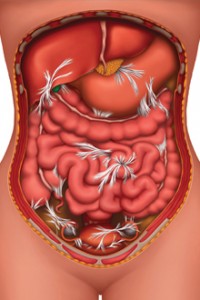
One way of preventing an adhesion-related bowel obstruction surgery is Clear Passage, a manual physical therapy that uses no surgery or drugs. Adhesions are bands of internal scar tissue that form after surgery, trauma, infection, or inflammation; there is no way of preventing adhesion formation as the body heals from these events. Clearing an existing obstruction and preventing re-obstruction requires decreasing the adhesions.
You should seek immediate medical care as soon as you begin experiencing symptoms of an obstruction. There are also steps you can take, in conjunction with the care provided by your medical team, to manage a partial obstruction and reduce your chances of developing a complete obstruction.
How to Prevent Complete Bowel Obstruction Through Dietary Changes
You will want to either minimize or completely eliminate fiber from your diet, depending on the severity of your obstruction. Dietary fiber is the edible component of plant foods that humans are unable to digest. Reducing fiber intake limits the amount of undigested material that passes through the large intestine, which decreases bowel movements and helps to ease other symptoms such as abdominal pain.
The three main diet tracks outlined below can help bowel obstruction patients relieve and manage their symptoms. We encourage you to download our complete Digestive Health Guide for a step-by-step explanation of each diet plan.
Low-Fiber Diet
- Cook vegetables thoroughly to minimize the amount of gas they produce after consumption.
- Do not continue eating any foods that appear to make your symptoms worse.
- If your symptoms improve, reintroduce a greater variety of foods into your diet one at a time, in conservative amounts. This will enable you to pinpoint foods that you cannot have.
Minimal Fiber Diet
- Transition to this track from the Low-Fiber Diet if your bowel obstruction symptoms become worse or begin occurring more often.
- This diet has less residue than the Low-Fiber Diet. However, if you continue to have abdominal or stomach pain and intestinal cramping while following this diet plan, you may need to work with your healthcare team to lower your residue intake even more.
Liquid Diet
- Follow this diet, which has little to no residence, if you have severe symptoms with occasional or frequent vomiting after eating solid foods.
- Avoid all solid foods when on a liquid diet.
- Fluid intake is a crucial part of this diet track. Fluids are important for keeping your skin, eyes and the lining of your mouth moist, and for preventing dehydration.
Surgery and the Vicious Cycle
Our experience has shown us that surgery is not the solution for preventing future obstructions. The very surgery designed to remove the abdominal adhesions causing a patient to obstruct will almost always lead to more adhesions, leaving the patient trapped in a vicious cycle of adhesions-surgery-adhesions. Our therapy decreases adhesions without surgery, allowing patients to break the cycle and reclaim their lives.
Do you suffer from frequent, recurring bowel obstructions? Our therapists have helped many patients end the obstruction-surgery-obstruction cycle.
Discover freedom from recurring bowel obstructions with Clear Passage Physical Therapy’s innovative, non-surgical approach – Request Information and schedule your Free Consultation today to learn how our expert therapists can help you break the adhesion-surgery cycle and reclaim your life, then visit our Apply to Therapy page to take the first step towards lasting relief and prevention.
Schedule a free phone consultation with an expert therapist to learn about our non-surgical treatment for bowel obstruction.
References
- http://www.summitmedicalgroup.com/library/adult_health/aha_small_bowel_obstruction/
- http://www.health.qld.gov.au/nutrition/resources/gastro_obstruct.pdf
- http://www.pennmedicine.org/pahosp/cancer/programs/gyn_onc/small_bowel.html
Related Content:
Research and Success Rates
- Study Results for a Non-Surgical Bowel Obstruction Treatment
- Study Results for a Non-Surgical Bowel Obstruction Treatment
- Bowel Obstruction Success Rates
Questions Answered
- Recurring Small Bowel Obstruction Treatment Frequently Asked Questions
- The Most Common Causes of Bowel Obstruction and How to Prevent It
- Bowel Blockage Symptoms
- How to Prevent Bowel Obstruction
- Can Diverticulitis Cause Bowel Obstruction?
- Seven Signs of Intestinal Blockage
- What to know before accepting an IBS Diagnosis
- How Long Does a Bowel Obstruction Last?
- What is the Cause of a Small Bowel Obstruction and What Are Your Options for Treatment?
- How Will My Lifestyle Change with Small Bowel Obstructions?
- Is There a Natural Treatment for Small Bowel Obstruction?
- What SBO Patients Can Expect From Treatment
Treatment
- At a Glance: Bowel Obstruction
- Bowel Obstruction
- Bowel Obstruction – Need Help Now?
- Bowel Obstruction Treatment
- [Infographic] The Main Causes of Bowel Obstructions
Patient’s Stories
- Bowel Obstruction: Patient Story Update
- Video Testimonial – A Mother’s Journey to Recovery: Small Bowel Obstruction
- What Is Bowel Obstruction? – A Patient’s Perspective
- A Glimpse into a Brave Young Boy’s Journey with CHARGE Syndrome
- Success Story: Clear Passage Allowed Me to Resume My Adventures
- Emergency Small Bowel Obstruction Surgery in India
- An End to Bowel Obstructions
Diet
- How to Relieve a Bowel Obstruction: Diet Guide
- Recipes For Bowel Obstruction Patients
- Diet Guide for Avoiding Bowel Obstruction
- Diet Modifications to Help You Handle a Small Bowel Obstruction
- Digestive Health Guide
- Bowel Obstruction: Diet & Lifestyle Recommendations
- Minimal Fiber Diet for Digestive Disorders
- Nutritional Guidelines
- Transitioning to a Regular Diet from a Low or Minimal Fiber Diet
- Low Fiber Diet for Digestive Disorders
Bowel Obstruction | SBO | SIBO


